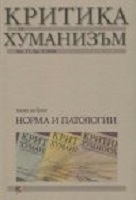БЪЛГАРСКИЯТ ЕВГЕНИЧЕН ПРОЕКТ ОТ 20-ТЕ И 30-ТЕ ГОДИНИ НА МИНАЛИЯ ВЕК И НОРМАТИВНИЯТ КОД НА "РОДНОТО"
THE BULGARIAN EUGENIC PROJECT IN THE 1920s AND THE 1930s AND THE NORMATIVE CODE OF THE “NATIVE”
Author(s): Gergana MirchevaSubject(s): Cultural history
Published by: Фондация за хуманитарни и социални изследвания - София
Keywords: “little value” individuals; Bulgarian eugenic project; cultural-historical reconstruction; normative patterns; “health qualification”
Summary/Abstract: This text treats the debate among Bulgarian jurists and representatives of the bio-medical and psychiatric competence in the 1920s and the 1930s, upon the advantages of eliminative and selective racial hygiene. The initiatives for elaboration of a legal sterilization act in Bulgaria, affecting different categories of “little value” individuals, are treated here as the core of the unrealized Bulgarian eugenic project. The text is an attempt for its cultural-historical reconstruction upon two parallel and interdependent conceptual levels. The genealogy of Foucault is a methodologically leading perspective towards the eugenic discourse as an aspect of the discourse on the abnormal. A conclusion is made that the normative patterns imposed on the physical and the psychical status are produced as a result of strategic ambiguous replacements of medical, organic norms and norms of behaviour (socio-moral and legal conventions). Parallel to this level of the analyses, the clichés and characters of the European racial discourse and that on the abnormality are problematized on a different level ≠ as modified in their Bulgarian cultural situation. During the discussion on the arguments for “health qualification” and disqualification of publicity, an utopian project for Bulgarian cultural identity is presented. Crucial role for the normalization of the Bulgarian society is assigned to the stable and dominant ethnonimical code of the “native” and its modification as psychosomatic. The pretensions of the medical-psychiatric discourse to monopolize the knowledge of the model man are re-interpreted with the values of the “race” as knowledge of the model Bulgarian. Culturally preconditioned images of the Bulgarian people as a collective organism and its eugenic transformations are treated in the text within the utopian horizon of the so called “right wing project”.
Journal: Критика и хуманизъм
- Issue Year: 2004
- Issue No: 17
- Page Range: 207-220
- Page Count: 14
- Language: Bulgarian
- Content File-PDF

